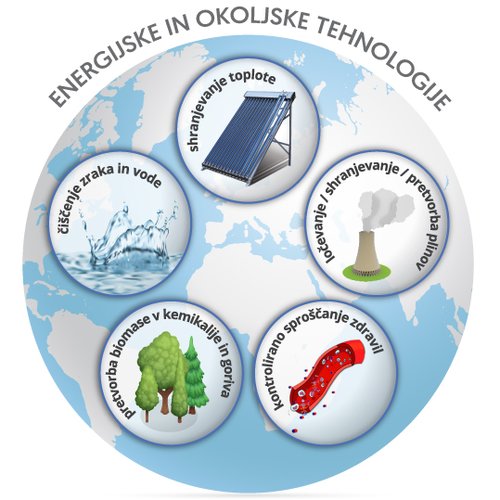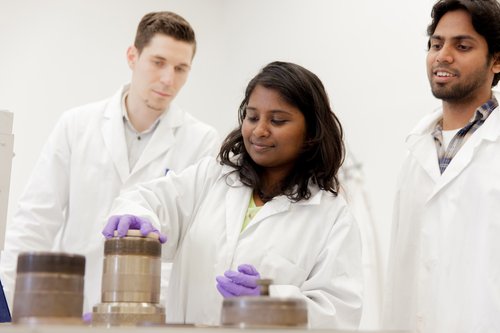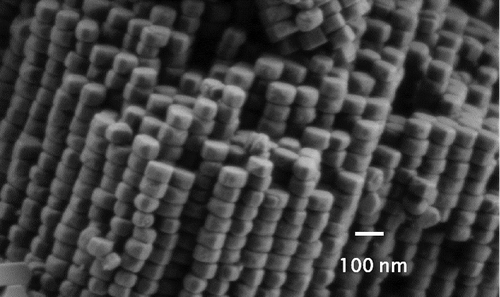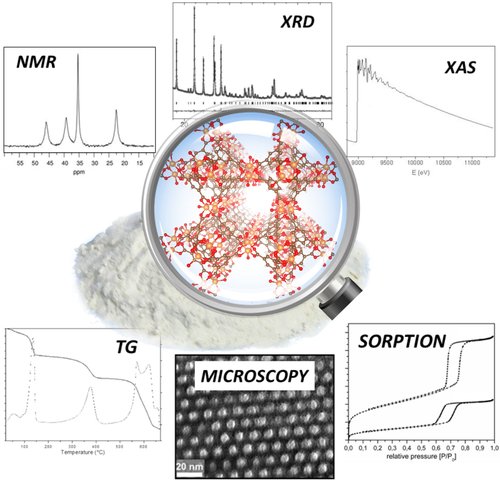Doctoral Study Programme Materials
The interdisciplinary doctoral study programme Materials combines expert knowledge in physics, chemistry, chemical engineering and theoretical chemistry. It offers broad knowledge and skills in designing various types of new functional mate- rials, their synthesis and characterisation, under- standing of the relationship between the structure and functional properties of materials and their up-scaling to industrial level. The programme specially focuses on the development of new materials for applications in energy and environ- mental technologies. The students are involved in the research work of material science laboratories and centres of UNG and of research laboratories of partner research institutes, such as the National Institute of Chemistry in Ljubljana, with which we closely cooperate in the implementation of the programme.
| Study programme: | Doctoral study programme Materials |
|---|---|
| Main fields of study: | Natural and mathematical sciences |
| Programme code: | 3MAT |
| Programme cycle: | Third cycle doctoral degree |
| Name of the qualification: | Doctor`s degree |
| Qualification title: | Doctor of Philosophy |
| Qualification abbreviation: | Ph.D. |
| Final examination: | no |
| Dean: | prof. dr. Martina Bergant Marušič |
| Programme director: | prof. dr. Nataša Novak Tušar |
| ECTS coordinator: | prof. dr. Iztok Arčon |
Programme description
The doctoral study programme Materials is interdisciplinary, research-oriented and designed for needs of industrial development. It offers knowledge and skills in designing various basic types of materials, from their synthesis to characterization and understanding of the relationship between the structure and functional properties of materials, and their applications. Four years programme (240 ECTS) also provides students with the knowledge and skills in developing materials for applications in energy and environmental technologies.
The main goal of the doctoral study programme Materials is to educate competent researchers who will be able to perform the theoretical and numerical analysis of materials, understand the relationship between the structure and functional properties of materials. They will also be trained in experimental work, i.e. synthesis and characterisation of materials, as well as the design and development of materials for targeted use. The organized forms of study create the basis for preparing a specific individual study and research programme for each student, decided between the student and the supervisor, based on the thesis research content. A horizontal link is enabled by the ECTS credit system, which enables doctoral students to choose subjects from other doctoral programmes at the University of Nova Gorica (UNG) Graduate School, and at relevant doctoral programmes at other universities, in accordance with the Rules of the Graduate School.
The students will be involved in the research work of laboratories and centres of UNG, and of research laboratories of partner research institutes, such as the National Institute of Chemistry and Institute Jožef Stefan in Ljubljana. Teachers and supervisors at the doctoral programme from UNG and the aforementioned partner institutions are recognized worldwide due to their research work on the design and development of different types of materials, and methods for material characterization.
After completion of their studies, the graduates of the doctoral study programme Materials will be able to independently design and develop different types of materials for targeted use. The relevant knowledge and competences will be acquired through the research work in the research laboratories with modern experimental equipment and technologies, and through cooperation with internationally recognized researchers. This guarantees the competitiveness of the graduates on the global knowledge market. With the acquired theoretical and practical knowledge and competences, they will be able to continue their research work at universities, research institutions and industry in Slovenia and abroad.
Admission requirements
To qualify for entry into the doctoral study programme Materials, applicants must satisfy the following admission requirements:
- have completed a 2nd cycle master’s study programme;
- have completed at least a four-year academic undergraduate programme accredited with 240 ECTS credits;
- have completed a uniform five year master’s study programme accredited with 300 ECTS credits;
- have completed a specialization after previously finished professional study programme, and had passed additional study obligations within 30 to 60 ECTS credit points;
- have completed an equivalent program abroad.
There are 15 positions available for enrolment in the study programme Materials.
If the number of applicants exceeds the number of available positions, successful candidates will be selected on the basis of their previous academic achievements.
Programme progression requirements
The study is organized in four years with 240 ECTS. Each year is evaluated with 60 ECTS.
In order to proceed to the second year of study of the doctoral study programme Materials, candidates must obtain at least 48 credit points in the first year.
The student submits the application for approval of dissertation topic in the second year of study. The application is considered and approved by the UNG Senate, which determines a three-member commission for the assessment of the dissertation and appoints one or two mentors. See »The Formal procedures for the submission, examination and defence of the dissertation of Graduate school of UNG«.
To enrol into the third year, candidates must fulfil all first-year requirements as well as obtain 60 ECTS credit points from the second year of study, i.e. the condition for enrolling in the third year is completion of 120 ECTS credit points. In the third year, the student focuses exclusively on research work III (60 ECTS credit points).
The condition for enrolling in the fourth year is the completion of the requirements of all three years (180 ECTS credit points). In the fourth year, students focus exclusively on research work IV (30 ECTS credit points) and preparation of the dissertation, which results in a defence of the doctoral dissertation (30 ECTS credit points).
The University of Nova Gorica Senate approved following two study regulations for all doctoral study programs to stimulate students to achieve better performance in their studies:
- The student may proceed to his/her doctoral dissertation defence only if he or she has obtained grade 8 or more in each subject taken within the respective study programme, the subjects being graded according to the existing Slovenian grading system from 1 to 10. This means that only those subjects in which the student has achieved at least 70% of the highest grade are recognised.
- The student wishing to proceed to the defence of the dissertation is required to provide one scientific article in the field of his/her research performed as part of his/her doctoral studies.
Recognition of knowledge and skills attained before enrollment
Skills and knowledge of a candidate attained previously through formal education can be recognized. Recognition is based on formal documents certifying these, and the recommendation of the Scientific council of the programme Materials. The extent and the content of the previous work are graded according to the ECTS system, with a maximum of 15 ECTS. Recognized skills/knowledge can replace courses covering comparable topics.
Knowledge obtained via life-long learning can at the study programme Materials be fully recognized without limitations to the total ECTS credits, as long as the courses are consistent with the programme at the second level and/or in accord with certain additional study obligations.
Recognition of ECTS points on the doctoral program Materials acquaired outside the enrolled study programme.
A student enrolled in a doctoral study program of the Graduate School of University of Nova Gorica may, during his studies, select some of elective courses within outside the enrolled study programme.
- The student may choose elective courses at other study programmes within the Graduate School up to 30 ECTS points.
- Within these 30 ECTS points, the student may also choose subjects from the accredited doctoral study programmes at other universities in Slovenia or abroad, within the limit of 24 ECTS points, which is 40% of the 60 ECTS points allocated for the organised forms of studying. Out of these 24 ECTS points, the student may obtain part (up to 10 ECTS points) of his/her knowledge at summer schools or at other non-accredited programmes or non-formal forms of education. The rules for the recognition of the ECTS credit points at UNG doctoral programmes are set out in the document adopted by the UNG Senate: “Procedures for the approval of taking exams and recognition of ECTS credits for obligations fulfilled outside the enrolled 3rd level doctoral study programme within the framework of other GS programmes or doctoral programmes outside the University of Nova Gorica”.
Transitions between programmes
Transitions to the doctoral study programme Materials from other doctoral programmes are possible only if those programmes are covering the field of materials, chemistry, physics, engineering and other related fields. The transitions have to be in accord with the currently valid legislation of the Republic of Slovenia (Law of higher education, Requirements for transitions between study programmes and other regulations).
Condition for completing the study program
Students must successfully pass all exams and all obligations in relation to all subjects fulfilled according to the curriculum, and successfully defence of the doctoral dissertation, for which the student collects 240 ECTS.
Educational and professional goals
Educational and professional goals
The main goal of the doctoral study programme Materials is to educate competent researchers who will be able to perform the theoretical and numerical analysis of materials, understand the relationship between the structure and functional properties of materials. They will also be trained in experimental work, i.e. synthesis and characterisation of materials, as well as the design and development of materials for targeted use.
The study is based on the work in a research group with an emphasis on a certain research field, which enables an advance of knowledge in the field. Each student is assigned a supervisor that monitors his or her progress in both the research work as well as regarding the examination requirements. The main goal of the courses is to give the students both the theoretical as well as practical knowledge needed in their research.
ECTS credit system
The doctoral study programme Materials is designed according to the principles of the Bologna declaration. The transparency of the system of studies is given by the ECTS credit system, which enables the transitions of students between various faculties and universities. This gives the students of the proposed programme the opportunity to visit foreign faculties, as they enable the students the participation in individual courses, semesters or years abroad.
Employment opportunities
After completion of their studies, the graduates of the doctoral study programme Materials will be able to independently design and develop different types of materials for targeted use. With the acquired theoretical and practical knowledge and competences, they will be able to continue their research work at universities, research institutions and industry in Slovenia and abroad.
Courses given per year
1st year| Seminar | 6 ECTS |
| Chosen topics | 24 ECTS |
| Research work I | 30 ECTS |
| TOTAL | 60 ECTS |
| Research work II | 30 ECTS |
| Chosen topics | 30 ECTS |
| TOTAL | 60 ECTS |
| Research work III | 60 ECTS |
| TOTAL | 60 ECTS |
| Research work IV | 30 ECTS |
| Dissertation | 30 ECTS |
| TOTAL | 60 ECTS |
Courses refresh
1. year
2. year
3. year
| Compulsory courses | Hours | ECTS |
|---|---|---|
| Research work III | 1800 | 60 |
4. year
| Compulsory courses | Hours | ECTS |
|---|---|---|
| Dissertation | 900 | 30 |
| Research work IV | 900 | 30 |





